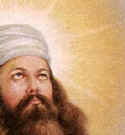The Early Years
There is very little known about the early days of Zarathushtra. The little that we do know is mainly because of the legendary stories that have been passed down through the generations by memorizing the scripture. Therefore, below, you will simply read different legendary and even mythical stories about Zarathushtra. If any of it seems too far-fetched to be real, it probably is not. We hope you enjoy these stories in the spirit that they were created:
Once upon a time, a very long time ago, in a distant land, by the banks of a river, lived a large family named Spitama (meaning Most White). The head of one branch of this family, named Hechadaspa (Stallions), had two sons: Pourushaspa (Many Horses) and Arasti (Tidy & Neat).
Pourushaspa had married a young woman named Dughdova (Milkmaid), who by this time was pregnant. It is said that when she was 5 months pregnant, she had a dream in which she saw the world was being destroyed, and she was very frightened. But then an angel came to her in her dream, and told her that she was bearing a great prophet who would be able to change the impending destruction.
Legend has it that on the 26th of March; the pregnant Dughdova gave birth to a young and healthy baby boy. However, this was a peculiar baby, since unlike other babies, he did not cry. Instead, when this baby boy was born, he had a broad smile on his face, and his face was shining with a divine glow.
His parents decided to name him Zarathushtra, (which according to one translation means Golden Light or Golden Star, and according to another means Owner of yellow or old Camels.) Arasti’s family also had a son named Maidhyoimangha or Maedyoimaha (Mid Moon).
Zarathushtra was growing up as a very intelligent and energetic young boy. He was very observant and had a sharp mind. He had the ability to see through the surface of things and penetrate to the depth of their cause and meaning. Because of his inquisitiveness and natural curiosity, he always had lots of questions to ask the priests and teachers of his time; however, he was rarely satisfied with the explanations that he was receiving.
When he was nine years old, some of his friends arranged that he would have a meeting with the head priest of his town, and discuss the questions that he had. Zarathushtra was very much looking forward to this debate.
The story goes that on the day of the debate, Zarathushtra and the head priests spend a number of hours discussing the questions that he had. However, neither side managed to convince or satisfy the other. The depth of some of his questions had troubled the head priest, and he left the place in deep thought.
Although when the head priest left, he was in good health, legend has it that on his way home, he suffered a massive heart attack and died.
.There are many other stories of how he had to face all sorts of magical evil powers, and how he escaped them; however, we will not discuss them here.
Zarathushtra spent much of his youth in the surrounding pastures of his town, contemplating nature for many hours. It was during these meditations that many of the questions that the priests could not answer, would unravel themselves in ways that their answers would be revealed to him.
There is another story that says when Zarathushtra was fifteen, his four brothers approached him to divide their father’s wealth among themselves. Zarathushtra only took one item, symbolizing the spiritual life, and left the entire wealth of his father to his four brothers
When Zarathushtra was only twenty years old, he left home for about ten years, traveling here and there, in search of Truth. And it was one early morning at the end of this time that he was illumined.
It is also said that he married a woman named Hvovi, before his illumination, although it is not known where and when.
© Shahriar Shahriari
December 9, 1997
Vancouver, Canada
